第54章 WHICH EMBRACES A PERIOD OF SEVEN YEARS.(18)
It is not our purpose to make a great and learned display here, otherwise the costumes of the company assembled at this fete might afford scope for at least half-a-dozen pages of fine writing; and we might give, if need were, specimens of the very songs and music sung on the occasion. Does not the Burney collection of music, at the British Museum, afford one an ample store of songs from which to choose? Are there not the memoirs of Colley Cibber? those of Mrs.
Clark, the daughter of Colley? Is there not Congreve, and Farquhar--nay, and at a pinch, the "Dramatic Biography," or even the Spectator, from which the observant genius might borrow passages, and construct pretty antiquarian figments? Leave we these trifles to meaner souls! Our business is not with the breeches and periwigs, with the hoops and patches, but with the divine hearts of men, and the passions which agitate them. What need, therefore, have we to say that on this evening, after the dancing, the music, and the fireworks, Monsieur de Galgenstein felt the strange and welcome pangs of appetite, and was picking a cold chicken, along with some other friends in an arbour--a cold chicken, with an accompaniment of a bottle of champagne--when he was led to remark that a very handsome plump little person, in a gorgeous stiff damask gown and petticoat, was sauntering up and down the walk running opposite his supping-place, and bestowing continual glances towards his Excellency. The lady, whoever she was, was in a mask, such as ladies of high and low fashion wore at public places in those days, and had a male companion. He was a lad of only seventeen, marvellously well dressed--indeed, no other than the Count's own son, Mr. Thomas Billings; who had at length received from his mother the silver-hilted sword, and the wig, which that affectionate parent had promised to him.
In the course of the month which had elapsed since the interview that has been described in the former chapter, Mr. Billings had several times had occasion to wait on his father; but though he had, according to her wishes, frequently alluded to the existence of his mother, the Count had never at any time expressed the slightest wish to renew his acquaintance with that lady; who, if she had seen him, had only seen him by stealth.
The fact is, that after Billings had related to her the particulars of his first meeting with his Excellency; which ended, like many of the latter visits, in nothing at all; Mrs. Hayes had found some pressing business, which continually took her to Whitehall, and had been prowling from day to day about Monsieur de Galgenstein's lodgings. Four or five times in the week, as his Excellency stepped into his coach, he might have remarked, had he chosen, a woman in a black hood, who was looking most eagerly into his eyes: but those eyes had long since left off the practice of observing; and Madam Catherine's visits had so far gone for nothing.
On this night, however, inspired by gaiety and drink, the Count had been amazingly stricken by the gait and ogling of the lady in the mask. The Reverend O'Flaherty, who was with him, and had observed the figure in the black cloak, recognised, or thought he recognised, her. "It is the woman who dogs your Excellency every day," said he.
"She is with that tailor lad who loves to see people hanged--your Excellency's son, I mean." And he was just about to warn the Count of a conspiracy evidently made against him, and that the son had brought, most likely, the mother to play her arts upon him--he was just about, I say, to show to the Count the folly and danger of renewing an old liaison with a woman such as he had described Mrs.
Cat to be, when his Excellency, starting up, and interrupting his ghostly adviser at the very beginning of his sentence, said, "Egad, l'Abbe, you are right--it IS my son, and a mighty smart-looking creature with him. Hey! Mr. What's-your-name--Tom, you rogue, don't you know your own father?" And so saying, and cocking his beaver on one side, Monsieur de Galgenstein strutted jauntily after Mr.
Billings and the lady.
It was the first time that the Count had formally recognised his son.
"Tom, you rogue," stopped at this, and the Count came up. He had a white velvet suit, covered over with stars and orders, a neat modest wig and bag, and peach-coloured silk-stockings with silver clasps.
The lady in the mask gave a start as his Excellency came forward.
"Law, mother, don't squeege so," said Tom. The poor woman was trembling in every limb, but she had presence of mind to "squeege"Tom a great deal harder; and the latter took the hint, I suppose, and was silent.
The splendid Count came up. Ye gods, how his embroidery glittered in the lamps! What a royal exhalation of musk and bergamot came from his wig, his handkerchief, and his grand lace ruffles and frills! A broad yellow riband passed across his breast, and ended at his hip in a shining diamond cross--a diamond cross, and a diamond sword-hilt! Was anything ever seen so beautiful? And might not a poor woman tremble when such a noble creature drew near to her, and deigned, from the height of his rank and splendour, to look down upon her? As Jove came down to Semele in state, in his habits of ceremony, with all the grand cordons of his orders blazing about his imperial person--thus dazzling, magnificent, triumphant, the great Galgenstein descended towards Mrs. Catherine. Her cheeks glowed red-hot under her coy velvet mask, her heart thumped against the whalebone prison of her stays. What a delicious storm of vanity was raging in her bosom! What a rush of long-pent recollections burst forth at the sound of that enchanting voice!